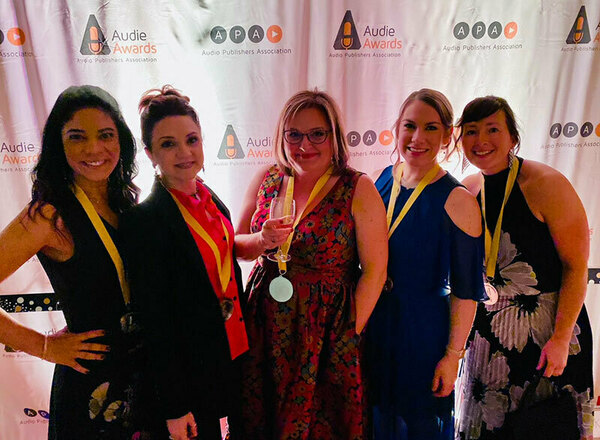
There’s a lot at stake for the narrator of an audiobook — their ability to reflect the traits of the characters can make or break the listening experience.
That’s because narrating is so much more than simply reading a book, or even acting. A narrator may have several or even dozens of characters to portray, each with different intonations, accents, and other traits.
That’s where Siiri Scott has shined — she’s proficient in more than 40 dialects, including Indian (Dubai), British (RP, Cockney, Estuary, Yorkshire), Irish (Dublin, Donegal), Nigerian, Greek, Italian, Spanish (Mexican, Cuban, Puerto Rican), Australian (Sydney), Scottish (Edinborough, Highlands), Arabic (Lebanese), German, Finnish, and Viennese.
Her methodology for researching and designing dialects for theatre, film, and voiceover work is a skill she teaches to Notre Dame students as head of acting and directing in the Department of Film, Television, and Theatre and one she uses as a rising star in the world of audiobook narration.
Through her process that involves analyzing vowels, consonants, mouth and articulator placement, musicality, language, and some ethnographic research, Scott is able to break down any dialect and teach or perform it.
“As a multiracial actor, I’ve been able to use this skill to carve a niche in which I can play both white and non-white characters,” she said. “It’s even allowed me to play roles in books that I would never be considered for as a stage and film actor.”
Getting her start
A glance at Scott’s resume will make clear that she’s rarely bored. Her accomplishments in the arts include acting, directing, and producing for the Chicago Shakespeare Theater, Lifeline Theatre, the Irish Theatre of Chicago, and taking on roles for WCIU in Chicago, CBS’ City of Angels, and posts in theatre in Milwaukee, Seattle, and elsewhere. For the last 22 years, she’s been teaching at Notre Dame.

But the move out of Chicago to South Bend a few years ago left her with fewer opportunities to take on roles in the city’s theatre scene. About five years ago, after seeing some friends enjoy narrating audiobooks, she landed her first gig in the genre. Those first jobs were done in closets to dampen sound, with blankets and blocks piled up to improve the audio quality.
Now, she has a professional booth installed in her apartment and she is in great enough demand that she can be very selective about the projects she auditions for.
Her versatility in multiple dialects opens doors in some cases when a book has characters from different corners of the globe. In Moti on the Water by Leylah Attar, for example, Scott was able to take on both Greek and Indian dialects.
“I like doing historical fiction and memoir a lot, because you get to be the protagonist. I like nonfiction because it’s basically about teaching,” she said. “My rule is, if my parents can listen to it and my students can listen to it, we’re totally good.”
A gift to pass on
After narrating dozens of audiobooks, Scott’s hard work in the field hasn’t gone unnoticed.

She’s been nominated for an Audie, an annual award given by the American Audio Publishers Association for audiobooks and spoken-word entertainment, and won two Earphone Awards from AudioFile magazine that honor “truly exceptional titles that excel in narrative voice and style, characterizations, suitability to audio, and enhancement of the text.”
She was also in the cast of narrators for a book that received a 2019 Society for Voice Arts and Sciences Voice Arts Award.
One of the most rewarding parts of that success, Scott said, is the ability to pass it on to colleagues and students. She’s a sought-after speaker at conferences where she can teach the basics of dialects to others in the industry, and she has added a voiceover course at Notre Dame to her teaching duties.
“It’s a place where I can actually make a difference in the industry,” Scott said. “It’s really great for students to see someone who is professionally engaged in the industry and isn’t just teaching from a textbook. It’s a gift that I have that I can give to them.”
Originally published by at al.nd.edu on May 10, 2022.